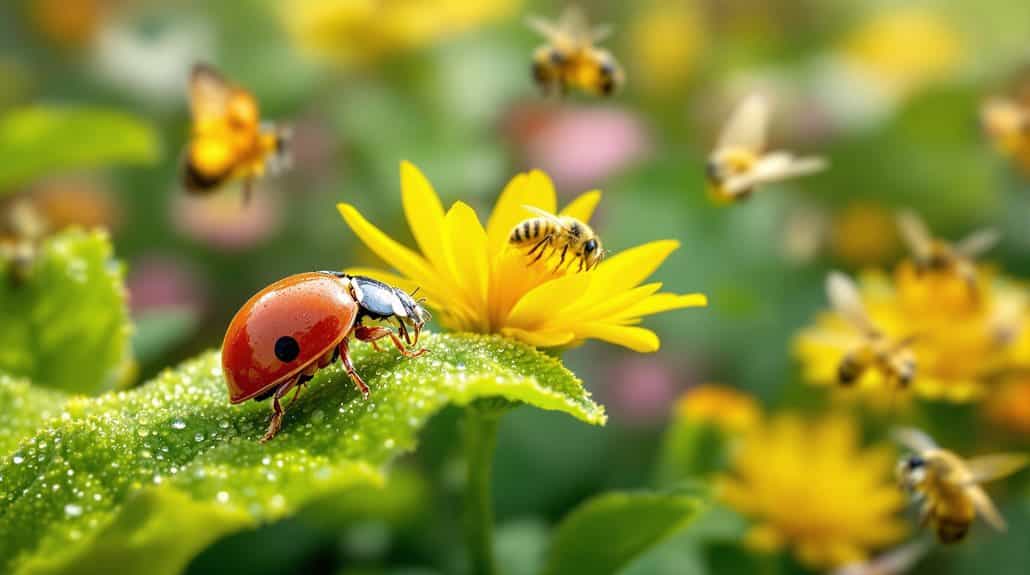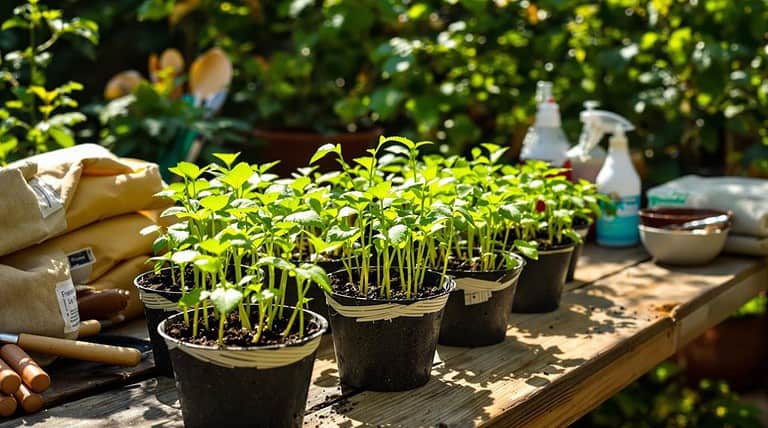Surprising Facts About Garden-Friendly Bugs
You might think of bugs as mere nuisances, but garden-friendly insects are vital to a thriving ecosystem. For instance, did you know that bumblebees can actually find their way using electric fields emitted by plants? And ladybugs, often seen as charming, can eradicate thousands of aphids in their lifetime. These tiny allies not only contribute to pest management but also engage in fascinating behaviors, like ants that farm fungi. Curious about how these insects interact with your garden and what other surprising roles they play? The details might just change your viewpoint on these little critters.
TLDR
- Honey bees and bumblebees are essential for pollination, significantly boosting plant growth and garden productivity.
- Ladybugs and lacewings can naturally control pest populations, like aphids, reducing the need for chemical pesticides.
- Some ants optimize their foraging routes using mathematical principles, showcasing their complex behavior in the ecosystem.
- Butterflies not only enhance garden aesthetics but also support overall biodiversity by pollinating various plants.
- Ground beetles thrive in leaf litter, maintaining soil health and controlling pests hidden underground.
Types of Beneficial Insects
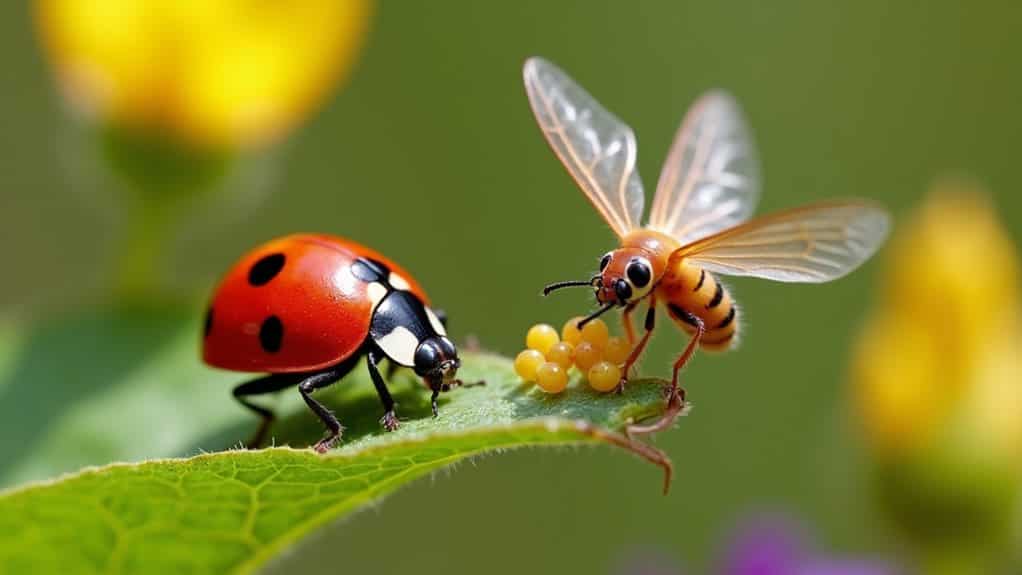
What types of beneficial insects can you invite into your garden?
You've got honey bees buzzing around, bumblebees doing their magical "buzz pollination," and even sweat bees lending a hand.
Don't forget the butterflies and ladybugs—those cute little aphid assassins! Additionally, inviting dragonflies into your garden can significantly help control mosquito populations, ensuring a healthier environment for your plants.
With all these helpers, your garden will thrive, making it a happy, pollinator-friendly paradise. Beneficial insects play a vital role in natural pest management, ensuring your plants stay healthy and productive.
Plus, who doesn't love a bit of nature's teamwork?
Habitat Preferences
While creating a garden that attracts beneficial insects, it's essential to take into account their habitat preferences.
Think about providing leafy plants, ground covers, and even those cozy brush piles! These little critters love cozy spots. Ground beetles thrive in leaf litter, preying on insect eggs and larvae, which makes a diverse garden not only look great, but it's a bug paradise! Additionally, maintaining healthy soil aeration is crucial for supporting the overall ecosystem in your garden.
Don't forget water sources, like shallow saucers with pebbles—no drowning allowed!
Essential Food Sources
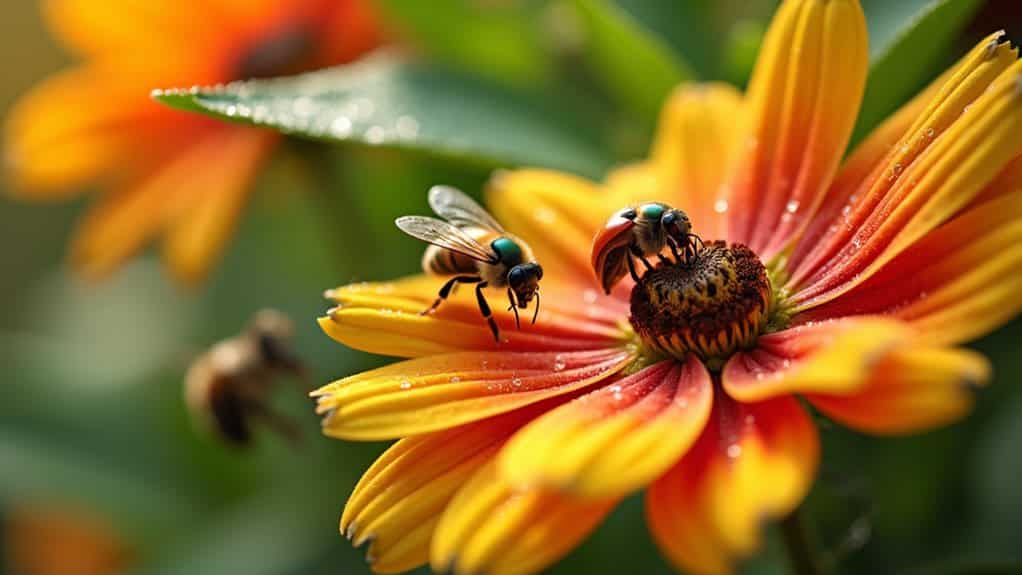
When you think about bugs in your garden, it's easy to forget that they need food just like you do!
These little critters have specific nutritional needs that keep them buzzing around, so let's chat about what makes their bellies happy—like pollen and nectar from your favorite flowers, plus the importance of organic matter in the soil. Beneficial insects, such as ladybugs and lacewings, thrive on pests like aphids, making them invaluable for natural pest control.
In addition, providing a habitat that encourages natural pest control can increase the presence of these beneficial insects, enhancing the overall health of your garden.
Have you ever noticed how a well-fed ladybug can munch through pesky aphids like they're at an all-you-can-eat buffet?
Nutritional Needs of Insects
Insects rely on a variety of essential food sources to meet their nutritional needs. They need proteins for building cells and enzymes, carbohydrates for energy, and lipids to keep everything running smoothly. Complete protein sources are crucial for insects, as they provide all essential amino acids necessary for their growth and development.
Don't forget vitamins and minerals, too! Just like you can't survive on candy alone, insects require a balanced diet to thrive.
Pollen and Nectar Sources
Meeting their nutritional needs goes beyond proteins and carbohydrates; pollen and nectar play an essential role in the diets of many beneficial insects.
Think about it! Flowers like zinnias and sunflowers aren't just pretty; they're like buffet tables for wasps and lady beetles! With accessible nectar and protein-packed pollen, these flowers keep our garden superheroes energized and ready to battle pesky pests. Additionally, native options often provide richer resources for these helpful insects, making them a valuable choice for any garden.
Organic Matter Importance
Organic matter serves as a fundamental food source in your garden, fueling both soil health and the diverse organisms that inhabit it. Think of it as a buffet for soil microbes, providing energy and essential nutrients like nitrogen and phosphorus. Plus, it makes the soil easier to work with! Furthermore, it plays a critical role in nutrient cycling, ensuring that valuable resources are continuously replenished for plant growth.
Plants That Attract Bugs
Creating a garden that buzzes with life starts with choosing the right plants to attract beneficial bugs.
Think about planting zinnias for their bold blooms, or dill, which not only spices up your pickles but also invites friendly wasps! Dill attracts a variety of beneficial insects, making it a fantastic choice for enhancing pollinator diversity. Additionally, incorporating coffee grounds can enhance soil fertility, creating an optimal environment for these plants to thrive.
Don't forget mint and lavender for their fragrant charm. These plants create a welcoming space for our tiny garden helpers—let's get growing!
Role in Pest Management
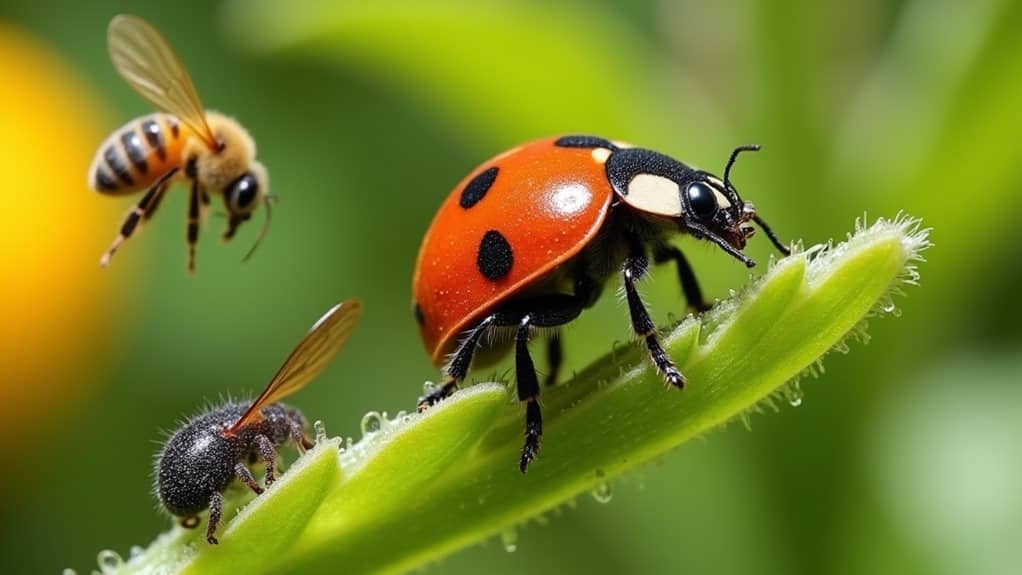
When it comes to keeping your garden healthy, those little bugs might just be your best buddies! Think about it: ladybugs are like tiny aphid-eating superheroes, while ground beetles are the stealthy ninjas that take out those pesky pests hiding in the soil. Predatory insects like lacewings and praying mantises also play a crucial role in maintaining a balanced ecosystem by controlling pest populations. Additionally, some beneficial insects can help neutralize dog urine that might affect nearby plants, promoting a healthier garden environment.
Effective Aphid Control
Effective aphid control plays an essential role in maintaining a healthy garden ecosystem.
You can blast those pesky aphids off your plants with a strong stream of water—just be gentle on the little guys!
For a DIY approach, mix liquid soap with water and spray away.
And don't forget to invite ladybugs to the party; they love snacking on aphids! Additionally, employing natural predators like lady beetles and green lacewings can significantly enhance your control efforts.
Ground-Dwelling Pest Predators
Ground-dwelling pest predators, particularly ground beetles, play an essential role in managing garden pests.
These little warriors munch on pesky critters like aphids and snails, keeping your plants healthy. Ground beetles are known for their ability to consume a wide variety of pests, making them invaluable allies in the garden.
Imagine them as nature's pest control squad! To attract these beetles, create cozy homes with mulches and beetle banks.
It's like giving them a five-star hotel in your garden—who wouldn't love that?
Caterpillar and Mite Management
How can you keep your garden thriving while managing pesky caterpillars and mites?
Start by inviting some tiny allies like parasitic wasps and nematodes to feast on those munching pests. Natural predators like birds can also help keep caterpillar populations in check.
And don't forget about organic insecticides—Neem oil's your friend!
Regularly check your plants, and if you spot any caterpillars, it's time to give them the boot.
Happy gardening!
Additional Ecological Benefits
Beneficial insects provide numerous ecological advantages beyond pest control and pollination.
They're like nature's little superheroes!
For example, dung beetles break down waste, keeping your garden tidy, while springtails help decompose organic matter. Additionally, these insects support overall garden health by promoting a balanced ecosystem.
Plus, these tiny critters recycle nutrients, ensuring your soil stays healthy.
Year-Round Garden Allies
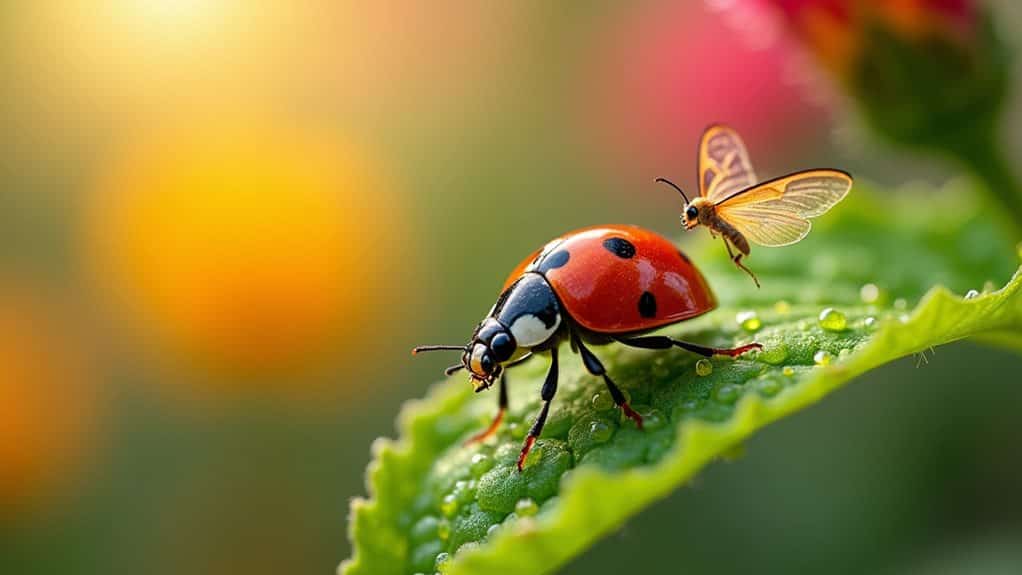
While you might think of garden pests as the biggest threat to your plants, it's essential to recognize that certain insects can be your allies throughout the year.
By planting a mix of colorful flowers like zinnias and marigolds, you're basically throwing a party for ladybugs and lacewings! Plus, leaving some weeds around? That's like giving them a cozy hotel! Beneficial insects help maintain ecological balance by preying on harmful insects, contributing to a healthier garden ecosystem.
Surprising Bug Behaviors
In the intricate world of gardens, bugs display some truly surprising behaviors that can leave you in awe.
Did you know that certain ants build traps to snag unwary prey? Or that bumblebees can sense the electric fields of flowers? These clever critters, from trap-making ants to fungus-farming leafcutters, really know how to get things done—and they make gardening more fascinating! Additionally, some species of ants apply Fermat's principle of least time when foraging, optimizing their routes to efficiently gather food.
And Finally
So, next time you're digging in the dirt or watering your plants, remember that those little garden-friendly bugs are like tiny superheroes working behind the scenes! They're not just cute; they're essential for keeping your garden thriving and pest-free. Who knew that bumblebees could steer with electric fields or that ladybugs are basically bug-eating machines? Welcome these remarkable critters, and your garden will thank you with colorful blooms and juicy veggies! Happy gardening!

